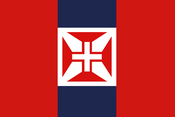National Syndicalists (Portugal)
This article needs additional citations for verification. (October 2014) |
National Syndicalist Movement Movimento Nacional Sindicalista | |
|---|---|
 | |
| Founder | Francisco Rolão Preto |
| Founded | 1932 |
| Banned | 29 July 1934[1] |
| Preceded by | Integralismo Lusitano |
| Newspaper | Revolução |
| Ideology | National syndicalism Clerical fascism |
| Political position | Far-right |
| Religion | Catholic Church |
| Colours | Blue |
| Party flag | |

[2] | |
The National Syndicalist Movement (Portuguese: Movimento Nacional-Sindicalista) was a political movement that briefly flourished in Portugal in the 1930s. Stanley G. Payne defines them as a fascist movement in his typography.[3]
Development
The MNS emerged amongst a group of students who were associated with the Liga Nacional 28 de maio but had grown disillusioned with its right-wing economic platform.
Salazar allowed the group to hold a national conference in November 1933 and indicating if they abandoned open syndicalism he would be prepared to bring them into his National Union en bloc.[5] Whilst this proposal was not accepted by the MNS as a group many members approved, resulting in a split within the movement in early 1934, with many of those in favour of the moderate approach rewarded with positions within Salazar's government.[5] Salazar announced the dissolution of the group on July 29, 1934, condemning the group for its defense of syndicalism.
Salazar used to call the MNS "National Communists".[citation needed]
Despite this official end the National Syndicalists carried on in secret and Rolão Preto helped to lead a
See also
- National Syndicalism
References
Bibliography
- ISBN 088033-9829.
- Costa Pinto, Antonio. 2019. "The Portuguese “Blue Shirts” and Salazar’s “New State”" in Reactionary Nationalists, Fascists and Dictatorships in the Twentieth Century. Springer.
- S. U. Larsen, B. Hagtvet & J. P. Myklebust, Who Were the Fascists: Social Roots of European Fascism, Oslo, 1980
- ISBN 0-203-50132-2.
